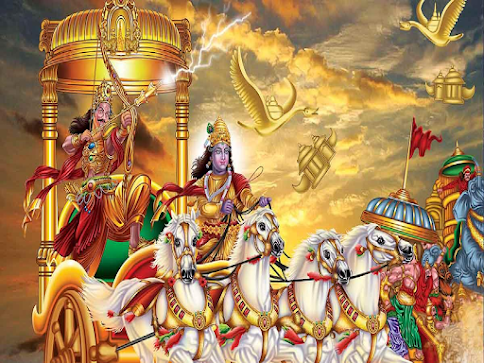Introduction:
One of the most renowned and enduring pieces of literature in the world is the Mahabharata. It is a lengthy epic poem that narrates the tale of two warring families, the Kauravas, and the Pandavas. It narrates their fights for dominance, honor, and righteousness. It was written in ancient India between 400 BCE and 400 CE. But the Mahabharata is not just a story about kings and warriors. It is a comprehensive and intricate work that covers complicated issues related to morality, ethics, and the human condition. It gives readers insightful information on these timeless topics.
We shall examine some of the most important themes from the Mahabharata, such as the value of honor, responsibility, and sacrifice, the perils of greed, and pride, and the transforming potential of knowledge and self-awareness.
1. The Value of Honour, Duty, and Sacrifice
The Mahabharata is a tale of heroes and villains, of warriors who must strive against overwhelming circumstances to maintain their honor and carry out their responsibilities. The value of honor, responsibility, and sacrifice, and how these qualities may aid us in navigating the complicated and sometimes perilous world we inhabit, is one of the main themes of the Mahabharata.
The Mahabharata is built around the idea of dharma, which is translated as "duty" or "righteousness." Every person has a responsibility to uphold the ethical and moral standards of dharma, which guide human behavior, and maintain integrity and honor in all facets of their lives. The Mahabharata's protagonists frequently have to make tough decisions between their own ambitions and their obligations to their family, community, and gods. These decisions are never simple, and the results of their choices may have far-reaching and significant effects.
2. The Dangers of Greed and Pride
The Mahabharata also teaches us about hubris and greed's perils. The Mahabharata characters are usually motivated by pride, respect, and honor, and often by goals for riches, prestige, and power.
Duryodhana, the oldest Kaurava, is among the most striking illustrations. Kaurava brothers, who become the story's major antagonist after becoming overwhelmed by greed and envy. Due to his obsession with wealth and power, Duryodhana makes a series of terrible decisions that culminate in the devastating war that wipes out his family and his kingdom.
The Mahabharata tells us that pride and greed are strong motivators that can deceive us and prevent us from seeing the effects of our choices. It is critical to be conscious of our own shortcomings and work to improve them via self-awareness and humility.
3. The Power of Wisdom and Self-Knowledge to Transform
The Mahabharata also teaches us the importance of wisdom and self-awareness in transforming our lives. The Mahabharata's characters are often forced to examine their own strengths, weaknesses, and shortcomings to learn about themselves and progress personally.
The third Pandava brother Arjuna, who must decide whether to slaughter his own family members in combat, is one of the most significant illustrations of this. Initially overcome with uncertainty and hopelessness, Arjuna eventually learns more about himself and his role in the universe with the aid of his charioteer, the deity Krishna. Krishna imparts knowledge to Arjuna about the nature of the self, the cosmos, and the significance of detachment and renunciation via their dialogues. In the end, Arjuna can get over his concerns and carry out his obligations as a warrior, although He does so with a fresh sense of knowledge and self-awareness.
The Mahabharata's central subject of self-awareness and change is one of the fundamental reasons why the epic has endured for so long in popularity and relevance. The Mahabharata teaches us that while we are all flawed and imperfect, we can learn to overcome these flaws and develop into better versions of ourselves. This is done by engaging in introspection and self-reflection.
Conclusion:
The Mahabharata is a classic piece of literature that offers insightful knowledge about ethics, morality, and the human condition. It informs us of the value of honor, responsibility, and sacrifice and cautions us against pride and greed. It also demonstrates wisdom's capacity for transformation and self-awareness and motivates us to pursue personal development and progress.We might be inspired by the Mahabharata's lessons and utilize them to direct our own moral and ethical decision-making as we negotiate modern life's difficulties. We may grow into better, more contented human beings and contribute to a more just and compassionate world by keeping our honor and integrity, avoiding greed and pride, and pursuing wisdom and self-knowledge.





.jpeg)





0 Comments